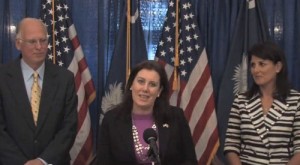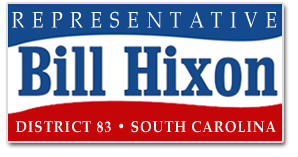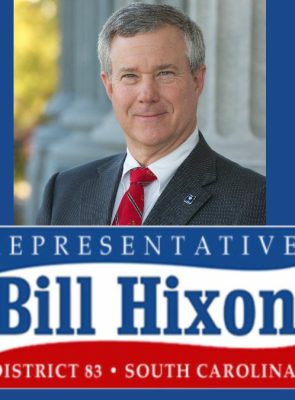Dear Friends,
The House was on furlough last week and will return to Columbia tomorrow, May 14th. We adjourned after finishing a successful "crossover week" and moved important House legislation to the Senate. We have nearly completed our agenda with more than a month left in the session.
 Governor Nikki Haley nominated Ms. Cheryl Stanton for the Executive Director position at the South Carolina Department of Employment and Workforce (DEW). Ms. Stanton is a shareholder with the law firm of Ogletree Deakins, a member of the South Carolina Chamber of Commerce.
Governor Nikki Haley nominated Ms. Cheryl Stanton for the Executive Director position at the South Carolina Department of Employment and Workforce (DEW). Ms. Stanton is a shareholder with the law firm of Ogletree Deakins, a member of the South Carolina Chamber of Commerce.
After the nomination, Chamber President and CEO Otis Rawl, said "Ms. Stanton's vast experience with business and workforce development issues, from her work with one of the nation's leading law firms to her time in the Executive Office of the President, make her uniquely suited to lead DEW. She understands that an available and skilled workforce is vital to business recruitment and retention efforts. She will bring an excellent business perspective to the agency."
Her nomination will now be sent to the Senate Labor, Commerce and Industry (LCI) Committee for consideration. The committee is chaired by Sen. Thomas Alexander. If you would like to read the article that appeared in The State on May 2, 2013, click here.
In order for me to have a strong voice in Columbia, I have to communicate with my constituents. And that is you! My website, newsletters, mailers and Facebook are the communication tools that I use. It takes extra time, staff and campaign funds to maintain them.
If you would like to contribute, please mail a check to Hixon for House, P.O. Box 7927, North Augusta, SC 29861, or contibute online by going HERE.
LEGISLATIVE UPDATE – May 13, 2013
Revising Concealable Weapons Permit Provisions
The House amended, approved, and sent to the Senate H.3822, a bill revising concealable weapons permits provisions. The legislation revises the requirements that must be met in order to receive a concealable weapons permit. Relating to definitions for purposes of concealable weapons permits, the legislation deletes the definition of "proof of residence" and revises the definitions of "picture identification" and "proof of training". The legislation deletes the requirement that an education course must be a minimum of eight hours, and the legislation provides that individuals with military training and retired law enforcement officers complete only the portion of the class reviewing statutory and case laws. The legislation increases the application fee for a permit for residents of the state from $50 to $75, and it provides for a nonresident application fee of $75. The legislation allows permit applications to be submitted online with State Law Enforcement Division (SLED). If an applicant submits his application online, the legislation authorizes SLED to continue to make all contact with the application through online communications. The legislation provides that a person may not carry a concealable weapon into a place clearly marked with a sign prohibiting the carrying of a concealable weapon on the premises, except that a property owner or an agent acting on his behalf, may allow individuals of his choosing to enter onto property regardless of any posted sign to the contrary. The legislation provides that a permit is valid for five years rather than four years, and it requires SLED to send a renewal notice at least 30 days before a permit expires. The legislation repeals Section 23-31-240 relating to persons allowed to carry a concealable weapon while on duty. Additionally, the legislation provides that a concealable weapons permit holder may secure his weapon under a seat in a vehicle, or in any open or closed storage compartment within the vehicle's passenger compartment.
Elimination of the High School Exit Exam
The House amended, approved, and sent to the Senate H.3919, legislation which provides for the elimination of the High School Exit Exam as a requirement for graduation and creation of the High School Assessment's Study Committee. Before being awarded a high school diploma, all South Carolina public high school students must achieve a passing score on both High School Assessment Program (HSAP) tests. This legislation provides that all students must take the HSAP tests, but successful passage of the tests is no longer a requirement to graduate. The legislation further provides that an eligible student who previously failed to receive a high school diploma or was denied graduation solely for failing the exit exam may re-enroll in high school and will not have to pass the exit exam to receive a high school diploma, and the legislation requires the Department of Education to remove any conflicting requirements and promulgate conforming changes in its applicable regulations. Additionally, the legislation creates the High School Assessment Study Committee to consider whether the high school assessment program should remain the accountability assessment used by the state and to recommend an alternative, if necessary. The legislation provides for the composition and staffing of the study committee, and it requires the committee to make a report to the General Assembly no later than January 31, 2014, at which time the study committee must be dissolved.
 Flag Protocol Changes
Flag Protocol Changes
The House returned S.237, legislation revising the protocol for flying State Capitol Building flags at half-staff in memory of fallen South Carolina military, to the Senate with amendments. The legislation revises the protocol so that State Capitol Building flags may be flown at half-staff in tribute for a period of five days before the day of the South Carolina funeral through the date of interment for members of the United States military services who were residents of South Carolina and who lost their lives in the line of duty while in combat. The legislation provides for flags to be hoisted and lowered as many times as is needed if the period of tribute is for multiple individuals. During the time of tribute, those memorialized must be identified on a visible place on the Governor's website.
Authorization of Disclosure of Medical Information
The House amended, approved, and sent to the Senate H.3366, a bill relating to the authorization of disclosure of medical information. Under the legislation, a health care provider or the provider's agent shall provide on the patient information form an opportunity for the patient to designate a family member or other individual as a person with whom the provider is allowed, but not required to, discuss the patient's medical condition and treatment plan. Provisions are established to provide a health care provider with immunity from legal liability for authorized disclosures made in good faith. The legislation does not apply to nursing homes, dentists, dental hygienists, or dental technicians. This legislation satisfies the Federal requirements relating to public health and the privacy rule of the Health Insurance Portability and Accountability Act of 1996 (HIPAA).
Protections for Reporting Child Abuse or Neglect
The House approved and sent to the Senate H.3124, legislation which provides protections for reporting child abuse or neglect. This legislation provides than an employer must not dismiss, demote, suspend, or otherwise discipline or discriminate against an employee or prospective employee who is required or permitted to report child abuse or neglect. An employee or prospective employee who is adversely affected by conduct that is in violation of these provisions may bring a civil action for reinstatement and back pay. An action may be brought against an employer, including the state, a political subdivision of the state and any office, department, independent agency, authority, institution, association, or other body in state government. An action must be brought within three years after the cause of action arises. If judgment is rendered in favor of the plaintiff in an action, the court shall award a reasonable attorney's fee in favor of the plaintiff against the defendant.
Expanding Prohibitions on Employment in Childcare Facilities
The House approved and sent the Senate H.3856, a bill expanding prohibitions on employment in childcare facilities. The bill adds those who have been convicted of unlawful conduct toward a child, cruelty to children, or child endangerment to the list of persons that childcare facilities are prohibited from employing.
 Autism Awareness License Plates
Autism Awareness License Plates
The House amended, approved, and sent to the Senate H.3961, the "Savannah Lee Monroe Autism Awareness Special License Plates Act". This legislation authorizes the Department of Motor Vehicles to issue Autism Awareness special license plates with proceeds distributed to the South Carolina Autism Society.
Payment Methods for DMV Services
The House amended, approved and sent to the Senate H.3907, a bill pertaining to methods of payment for the Department of Motor Vehicle (DMV) services. This legislation provides the DMV with an administrative remedy for returned checks. This legislation authorizes the DMV to accept uncertified checks for payment for fees, taxes, and other charges for products or services issued by the DMV. Also, the DMV may, upon approval of the State Treasurer, contract with banks or vendors to guarantee collection of funds paid by uncertified checks. The legislation authorizes the DMV to refuse to provide a person any product or service, except an identification card, until the person has paid all fees owed the DMV as a result of a returned check. The legislation clarifies the DMV's authorization to collect a returned check fee, and the legislation provides that the DMV may charge a processing fee for the use of credit cards. The legislation provides that all processing fees collected must be placed in a special restricted account to be used by the DMV to defray its costs.
Golf Carts
The House amended, approved, and sent to the Senate H.3631, relating to golf carts. This legislation moves existing golf cart provisions to Chapter 3 (Motor Vehicle Registrations and Licensing) of Title 56 (Motor Vehicles) so as to clarify that a violation of these provisions is subject to a misdemeanor penalty. Last session legislation passed by the General Assembly moved these provisions out of Chapter 3 and placed them in Chapter 2 (Specialized Vehicles) of Title 56. Additionally, the legislation removes a restriction on golf carts only operating during daylight hours; the legislation provides that the night-time prohibition does not apply to a golf cart that is equipped with working headlights and rear lights so long as the operator may legally operate a motor vehicle after daylight. The legislation provides that a sufficient portion of the five dollar golf cart registration fee is to be used by the DMV to pay expenses of producing and administering golf cart permits.
Mental Health Treatment for Children
The House approved and sent to the Senate H.3567, legislation regarding mental health treatment for children. The bill revises the definition of "children" and "adolescents" in need of mental health treatment who are in a residential treatment facility, to include young adults. The bill increases the eligibility age for treatment from eighteen to twenty-one years old.
Veterans Treatment Court Program Act
The House amended, approved, and sent to the Senate H.3014, the "Veterans Treatment Court Program Act" to address the criminal justice system's encounters with veterans who have returned from their military service having sustained traumatic brain injuries or suffering from service-related mental health impairments, such as post-traumatic stress disorder, depression, anxiety or acute stress. This legislation provides authority for each circuit solicitor to establish a veterans treatment court program, subject to the availability of funds, to divert qualifying nonviolent military veteran offenders away from the criminal justice system and into appropriate mental health and substance abuse treatment programs, thereby reserving prison space for violent criminals and others for whom incarceration is the only reasonable alternative.
Purchase of Precious Metals
The House amended, approved, and sent to the Senate H.3149, a bill revising provisions concerning the purchase of precious metals. The legislation specifies acceptable forms of identification a seller of precious metals must present to the buyer. The legislation modifies the term "purchase" to include means of being pawned to a dealer. The legislation increases the mandatory period for which a dealer in precious metals, except coins, must hold precious metals he purchases before he may sell them from seven days to fourteen days. The legislation requires the dealer to keep the item in the country where it was purchased during the holding period. The legislation expands the list of acceptable forms of identification that may be used to satisfy requirements for purchases of precious metal or semiprecious stones or gems. The legislation expands the list of locations where a permitted dealer in precious metals is not allowed to operate by adding a residential dwelling and a sub-leased space with a lease term of less than one year. Additionally, the legislation requires violations to be willful by dealers and increases penalties for the purchase of precious metals by a dealer with a revoked license.
Eminent Domain
The House amended, approved, and sent to the Senate H.3894, relating to factors that may be considered when determining just compensation in condemnation actions regarding eminent domain. This legislation includes reduction of value of the landowner's remaining property caused by reconfiguration of roadways, restriction of access and circuitous access.
Criteria for Admissions License Tax Exemption for Motorsports Complex
The House approved and sent to the Senate H.3783, a bill that revises criteria for the admissions license tax exemption for a motorsports entertainment complex by establishing the requirement that the complex be a NASCAR sanctioned motor speedway or racetrack that hosted at least one NASCAR Sprint Cup Series race in 2012, and continues to host at least one NASCAR Sprint Cup Series race, or any successor race featuring the same NASCAR cup series. By replacing the current requirement that the speedway have the same NASCAR Cup series. By replacing the current requirement that the speedway have at least 60,000 seats for race patrons, the legislation would allow the Darlington Raceway to continue to retain a portion of its admissions tax funds to be used for promotional expenses even if renovations at the race track should reduce the number of available seats.



